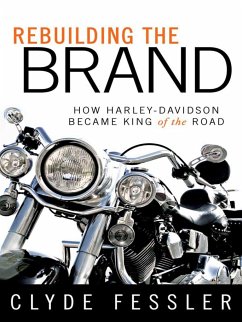In the early 1980s, Harley-Davidson was on the verge of bankruptcy. In the general public's opinion, quality was substandardof both motorcycles and riders. Harleys leaked oil and were often broken down. Riders were roughnecks, out to raise hell. The Harley-Davidson brand was tarnished. What s more, the charges were true. By the mid-1980s, Harley couldn't produce enough bikes to keep the public happy. Dealers were selling bikes off the showroom floor, struggling to assuage customers frustration. And today, Harley-Davidson is a model brand. Harley-Davidson isn't just a motorcycle company anymore. It is a community, a look, a source of self-expression, an all-American appeal for freedomall expressed in one little logo. So, what happened? How did Harley manage to pull itself from the fire, brush itself off, and ride off into the sunset? The secret: branding. Histories will tell you how Harley-Davidson closed the quality gap between Hogs and the cheaper, faster, sleeker Japanese bikes; how Harley used Japanese manufacturing methods to increase its cash flow; how Harley clawed its way back from the brink of bankruptcy. All these aspects were important to Harley s rise from the ashes, no doubt, and as such are discussed in this book. But the true power of the big, beautiful, orange and black machine that is Harley-Davidson lies in its image, the Bar and Shield, the brand. Rebuilding the Brand: How Harley-Davidson Became King of the Road is the story of how a core group led a team of not only marketing folks but also employees, management, dealers, and vendors to rebuild the Harley-Davidson image. Told through the perspective of Clyde Fesslerwho held several positions within Harley, from head of marketing services to VP of business developmentRebuilding the Brand provides dynamic branding information couched in an entertaining story. Fessler describes the methods used to create the iconic image Harley-Davidson enjoys today, methods that can be translated to nearly any industry, and explores the topics of brand experience, brand personality, brand extension, brand association, brand consistency, and brand welfare. Allworth Press, an imprint of Skyhorse Publishing, publishes a broad range of books on the visual and performing arts, with emphasis on the business of art. Our titles cover subjects such as graphic design, theater, branding, fine art, photography, interior design, writing, acting, film, how to start careers, business and legal forms, business practices, and more. While we don't aspire to publish a New York Times bestseller or a national bestseller, we are deeply committed to quality books that help creative professionals succeed and thrive. We often publish in areas overlooked by other publishers and welcome the author whose expertise can help our audience of readers.
Hinweis: Dieser Artikel kann nur an eine deutsche Lieferadresse ausgeliefert werden.
Hinweis: Dieser Artikel kann nur an eine deutsche Lieferadresse ausgeliefert werden.








